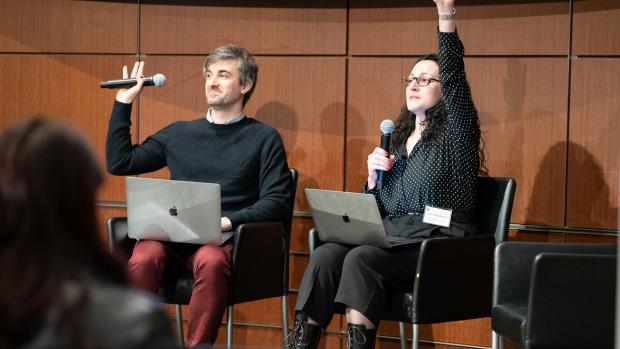Tandon is a vital participant in NYU’s new Alliance for Public Interest Technology

NYU Tandon Professors Ludovic Righetti and Julia Stoyanovich at the launch of the NYU Alliance for Public Interest Technology ©Ferrari: Courtesy of NYU Photo Bureau
The world has become increasingly complex since 1942, when science fiction writer Isaac Asimov conceived of his three “Laws of Robotics,” the first of which states: “A robot may not injure a human being or, through inaction, allow a human being to come to harm.”
Today, Asimov’s fictional rules still influence our thinking on automated systems and regulation. But as these systems are increasingly woven into our daily lives — from transport to insurance or government services — it’s clear that things aren’t quite as simple as the writer might have envisioned.
Add in issues of bias in artificially intelligent systems, technology that is inaccessible to the differently-abled, and the misuse of big data, and it becomes even clearer that there is a need for a new discussion about developing, regulating, and using tech that is in the public interest.
To that end, NYU has founded the Alliance for Public Interest Technology, a provostial cross-university initiative led by Vice-Provost Charlton McIlwain and a steering committee. The Alliance is a multidisciplinary group that aims to significantly impact the world’s current and future technology landscape. It launched in early February with an ambitious event that was organized and emceed by Mona Sloane, who teaches in Tandon’s Department of Technology, Culture, and Society and serves as a fellow at the Alliance, NYU’s Institute for Public Knowledge, and Tandon’s GovLab. The event was designed to showcase the strength and diversity of NYU faculty’s research in the area of public interest technology
In addition to Sloane, the launch event drew numerous other Tandon figures, including:
- Professor of Technology, Culture and Society Amy Hurst, who directs the Ability Project and who joined Steinhardt’s Mara Mills to discuss accessible tech and describe student projects, from the design of a multisensory waiting room at NYU’s Oral Health Center for People with Disabilities to creating tactile schematics for a vision-impaired electrical engineer.
- Victoria Alsina, who is connected to the GovLab and serves as academic director at the Center for Urban Science and Progress and who spoke of the need for public participation and collaborative governance – vital goals during an era in which trust in government is near historic lows.
- Stefaan G. Verhulst, the co-Founder of the GovLab, who joined Sloane to discuss “AI localism,” a framework that can help analyze how cities and citizens, rather than the federal government, are now taking the lead in innovating AI governance.
- Meredith Whittaker, the co-founder of the research institute AI Now, and Danya Glabau, the interim director of Tandon’s Science and Technology Studies program, who discussed labor and activism in an increasingly technocratic work world.
- Professors Ludovic Righetti (known for his accomplishments in the field of robotics) and Julia Stoyanovich (whose area of deep expertise is data science), the only practicing engineers to speak at the launch, called for a solid and pragmatic middle ground between mistrustful techno-bashing and unrealistic techno-optimism (whose proponents view technology as the answer to every ill facing the world). They stressed that while as of yet there is no such thing as an algorithm that guarantees “goodness,” responsible engineers, technologists, and scientists must work within the principles of the Belmont Report, which was published in the Federal Register in 1979 and which calls for beneficence, justice, and respect for persons when engaged in research.
Moving forward, the Alliance will focus on building on Public Interest Technology (PIT) work at NYU. PIT is already a core part of the university’s overall strategic approach to research, education, and service. This currently takes place both within and across departments and schools, individual campuses, and NYU’s global academic centers. NYU’s Alliance for Public Interest Technology will expand upon this work by supporting PIT students and graduates, assessing and evaluating their training and career trajectories, supporting new interdisciplinary PIT research, and developing pipelines for diverse students doing PIT work.




